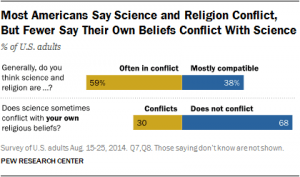Science Is in Conflict with Religion, but Not with My Beliefs

59% of Americans think science and religion are in conflict, according to the last survey from the Pew Research Center, but 68% affirm that science does not conflict with their own religious beliefs. The least religious observant people were more inclined to think that there is such a conflict.
Hispanic Catholics and white evangelical Protestants are the most likely religious groups to say that there is no conflict between religion and science, with approximately 50% of each group affirming so. However, 40% of white evangelicals admit that science is in conflict with their own personal beliefs.
76% of religiously unaffiliated Americans think that religion and science are often in conflict. This group includes people who are atheist or agnostic (about 1/3 of the total), and others with supernatural beliefs.
In the last 5 years, the percentage of people who think there is conflict between science and religion has dropped from 36% to 30%.
Scientific matters are increasingly important in the life of all individuals, and there is a debate about religion having a say on them. 46% of Americans think churches should not participate in science policy debates, and 50% think they should express their views.
Frequency of church attendance predicts views on science
Religious attendance is a strong factor in predicting views on topics like evolution, animal research or use of genetic tools to modify the human genome, with those attending religious services at least weekly not believeing in evolution and opposing genetic modification while approving the use of animals in medical research.
Based on previous research, Pew Center explains the differences of opinion respect to science are based on many factors other than religion, like political views, ideology, race, age, education, ethnicity and gender. For example, religion is just one factor among others equally important in determining people´s views on energy issues. Different attitudes towards this subject are observable among religious groups: Protestants -other factors being equal- are more likely to support offshore drilling. Religiously affiliated people are more prone to think that natural resources depletion will not happen.
Public perception of a series of important scientific issues is not influenced by religious views, once other factors are corrected. Topics include human trials with experimental drugs, transplant of artificial organs, GMOs, climate change, space exploration or public investment in science.
The statistical results are derived from multivariate analysis, which allows to predict the response of an individual on a given topic when all other factors are controlled or constant. The analysis included the following factors: religious affiliation, church attendance, political ideology and affiliation, scientific knowledge, general education, age, ethnicity, race and age.
Source: PRC

